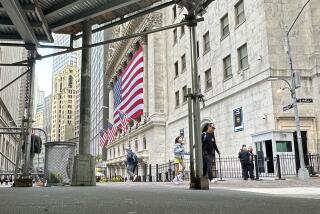Analysts Remain Wary as Stocks Rebound From Monday’s Plunge
The stock market snapped back Tuesday from Monday’s massive sell-off, as bargain hunters stepped up to buy devastated technology stocks trading at multiyear lows.
The Nasdaq composite index surged 91.40 points, or 4.8%, to 2,014.78, recovering much of Monday’s 129-point plunge that had left it at a 28-month low.
The Dow Jones industrial average gained 82.55 points, or 0.8%, to 10,290.80, after plummeting 436 points Monday.
Yet despite some encouraging signs Tuesday--including heavy trading volume and a rush of buying near the session’s close--many analysts warned that there is no certainty that the bottom has been reached in stocks’ yearlong slump.
“The market in the last few days has been suggesting . . . that the economy and [corporate] earnings are in much worse shape than we think,” said Hugh Johnson, chief investment officer at First Albany Corp. Tuesday’s rally “doesn’t neutralize or cancel that worry.”
Still, many analysts were relieved that key indexes opened Tuesday at levels above their Monday closes, instead of immediately spiraling lower. Nasdaq’s ability to rise back above the 2,000 mark was viewed as important.
Traders said the atmosphere was much calmer than on Monday, when there were outbreaks of panic selling.
Some pros said the Nasdaq rally represented a normal bounce-back from the torrid selling Friday and Monday that had been sparked by more earnings warnings from tech bellwethers.
The day showed that bear markets are treacherous even for bears, said Phil Marber, chief trader at Cantor Fitzgerald & Co.
Such markets are prone to sudden, sharp rallies like Tuesday’s, and they can last for days, even in the context of a months-long decline. “It’s very difficult for anybody to make money” in this market climate, Marber said.
Stocks began to sell off several times Tuesday, but buyers proved to have the upper hand. When it became clear that stocks would stay buoyant for the session, Marber added, the bears gave up and started buying stocks to cover their “short” positions, or bets on lower prices. That helped push indexes higher through the end of the trading day.
By the close, rising stocks outnumbered losers by 21 to 16 on Nasdaq, and losers had a 16-15 edge on the New York Stock Exchange.
Tech leaders resurging included Cisco Systems, up $2.56 to $21.38; Sun Microsystems, up $2.06 to $19.13; EMC, up $3.85 to $34.10; Juniper Networks, up $8.94 to $59.63; and BEA Systems, up $5.88 to $36.19.
“The rebound we saw was very positive, but this isn’t over,” said Brian Belski, market strategist at U.S. Bancorp Piper Jaffray. “We’re going to be back and forth here for a while.”
The Standard & Poor’s 500 index rose 1.5% to 1,197.66 but remained in bear-market territory, meaning a drop of more than 20% from its 2000 peak. The index just crossed that bear-market threshold Monday.
The rebound’s staying power is questionable, market watchers said, because the outlook for company profits--especially in tech--remains dismal and investor sentiment is shaky.
“We’ve gotten down far enough that there is going to be some bargain-hunting like what we’re seeing” Tuesday, said Richard Dickson, technical analyst at Scott & Stringfellow. “But I don’t think we’ve put the low on the market yet. We’re clearly still correcting the excesses in some of the tech stocks.”
Many investors’ greatest fear is that corporate earnings will continue to be weak for the rest of the year, instead of rebounding in the second half.
The Federal Reserve is expected to lower interest rates for a third time this year when it meets next Tuesday, but most market watchers expect it to provide little spark. They believe stock prices have already factored in the effects of such a cut.
“A lot of people had thought the Fed was going to be more aggressive, but it hasn’t been,” said Todd Clark, co-head of trading at WR Hambrecht.
The bond market was essentially flat Tuesday.
Some experts worried that Tuesday’s stock rebound was more evidence that the level of fear in the market still isn’t significant. Historically, bear markets have ended when most investors have been frightened of or disgusted by stocks.
“There just was not the sense of panic about a 400- or 500-point down day” that would have existed four or five years ago, said Jim Paulsen, chief investment officer at Wells Capital Management.
He thinks the market will bottom but not in a horrific flameout. Rather, tech stocks will bottom at some point and bounce along the bottom for a long period, he said.
“We’ll go from, ‘It’s bleeding a hole in my pocket,’ to, ‘It’s boring me to death,’ ” he said, referring both to technology and the market overall.
Among Tuesday’s highlights:
* Semiconductor stocks were strong. The sector has been one of the worst hit over the last six months. Winners included Micron Technology, up $3.29 to $44.05; Vitesse Semiconductor, up $4.50 to $44.56; and Broadcom, up $2.69 to $35.94.
* Among software stocks, Oracle rose $1.75 to $16.94, PeopleSoft gained $2.75 to $22.25, and Veritas Software jumped $5.19 to $59.13.
* Drug stocks continued to weaken. Merck fell $1.22 to $72.93, its lowest since October. Bristol Myers fell $1 to $61, and Pharmacia dropped $1.12 to $49.10.
* Energy stocks gave ground as money went back into tech. Apache lost $1.57 to $63.53, and Transocean Sedco slumped $2.02 to $48.06.
* Financial stocks rebounded. Merrill Lynch gained $3.75 to $55, Bank of America surged $2.63 to $54.25, and City National rose $1.17 to $37.43.
* Gold futures slid $5.50 to $266.80 an ounce. Gold had rallied modestly recently amid the stock market’s turmoil.
*
Market Roundup: C9-10
More to Read
Inside the business of entertainment
The Wide Shot brings you news, analysis and insights on everything from streaming wars to production — and what it all means for the future.
You may occasionally receive promotional content from the Los Angeles Times.










